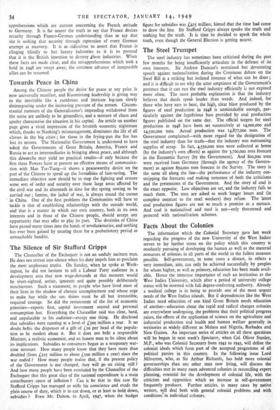The Steel Trumpet
The steel industry has sometimes been criticised during the past few months for being insufficiently articulate in the defence of its own interests. Sir Andrew Duncan's restrained but devastating speech against nationalisation during the Commons debate on the Steel Bill is a striking but isolated instance of what, can be done ; and it is difficult to see why the utter emptiness of the Government's pretence that it can run the steel industry efficiently is not exposed more often. The most probable explanation is that the industry believes that deeds speak louder than words. And indeed, for those who have, ears to hear, the high, clear blast produced by the figures of steel production in 1948 is unmistakable enough, par- ticularly against the lugubrious bass provided by coal production figures published on the same day. The official targets for steel production in 1948 have been set successively at 14,000,000 and 14,500,000 tons. Actual production was 14,877,000 tons. The Government complained—with more regard for the denigration of the steel industry than for truth—that the industry was outrunning supplies of scrap. In fact, 4,550,000 tons were collected at home (by the industry's own efforts) as against the 3,700,000 tons forecast in the Economic Survey (by the Government). And 800,_000 tons were received from Germany (through the agency of the Govern- ment) as against 85o,000 tons forecast in the Survey. The story is the same all along the line—the performance of the industry out- stripping the forecasts and making nonsense of both the criticisms and the pretensions of the Government. And the story of coal is the exact opposite. Low objectives are set, and the industry fails to reach them. The men are asked to work -longer hours and (in complete contrast to the .steel workers) they refuse. The latest coal production figures are not so much a promise as ,a menace. And coal is nationalised and steel is not—only threatened and pestered" with nationalisation schemes.


































 Previous page
Previous page